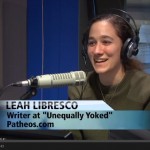After I wrote a review of The God Who Weeps, a book about Mormonism, I told Mormon readers to feel welcome to guest post to answer some of my questions or to add some clarifications. (Oh, and meanwhile, Joanne McPortland has also written a review talking about the similarities between Mormonism and Gnosticism). Over here chez moi, Carl Cranney has stepped up to the challenge. Here’s how he introduces himself:
Carl Cranney is a Mormon, yet is a PhD student in systematic theology at the Catholic University of America, where he gets into arguments with Catholics a lot. This is more fun than his MA at Yale, where nobody wanted to argue very much because they were mostly liberal Protestants and generally didn’t care enough about differences of doctrine. Okay, that’s not entirely true, but Carl does enjoy a good disagreement now and again.
In Leah’s recent post on The God Who Weeps from Teryl and Fiona Givens (which book I have not yet read) she ends with this critical point: “Reading through the whole book, it does seem like the authors think that these uncreated souls, in or out of human flesh, have some sort of telos. What I can’t figure out is where that obligation/binding comes from.”
Her concluding point is an interesting one, but ultimately a Catholic one that Mormon theology simply doesn’t really resonate with. In reading her posts over the months since we met, it became clear to me that Leah has a very strong personal belief/need/aesthetic orientation towards the idea of God as the author of the moral law and hence of our moral obligations. After all, one of the most frequently used tags for this blog is “whence moral law?”
However, Mormons have no such view of God as the author of the moral law. I’ll bet that most Mormons themselves believe that God is not the author of the moral law, because God himself was once as we are now, and progressed to become as He is now. I think, personally, that this stems from a misreading of Joseph Smith’s King Follet discourse. Basically, there are two options, and my quotes will be from the King Follet discourse, which is not official LDS canon but is still highly influential in Mormon theology:
1. God is God because he has always obeyed the moral law, and is helping us become as He is. “God found himself in the midst of spirits and glory, and because he was greater, he saw proper to institute laws whereby the rest could have the privilege of advancing like himself.” Mormons do not, however, have to believe that those laws are the equivalent of the moral law. I would personally rephrase it as follows: God was always God—He was always morally perfect, and then instituted the system-of which this mortal life is a part-that allows us to progress, through the grace of Christ, to be more in harmony with the moral law that God is already in perfect harmony with. This is my personal interpretation of Joseph Smith’s words.
2. God is God because he learned to obey the moral law perfectly, as had his father before him, and his father before him. In short, instead of turtles all the way down, it’s actually Gods all the way down. This idea also finds a cultural place in the LDS Hymn “If You Could Hie to Kolob,” showing that it has some degree of official approval. (“Kolob” here means the star “nearest unto the throne of God” in the very unexplained and esoteric musings on the heavens in Abraham 3.) Smith says, “I am going to tell you how God came to be God. We have imagined that God was God from all eternity. . . these ideas are incomprehensible to some, but they are simple. It is the simple and first principle of the gospel to know for a certainty the character of God, that we may converse with him as one man with another. God himself, the Father of us all, dwelt on an earth the same as Jesus Christ himself did, and I will show it from the Bible.” Then, later: “Here, then, is eternal life–to know the only wise and true God. And you have got to learn how to be Gods yourselves–to be kings and priests to God, the same as all Gods have done—by going from a small degree to another, from grace to grace, from exaltation to exaltation, until you are able to sit in glory as do those who sit enthroned in everlasting power.” This is the belief that most Mormons have, even if they recognize that we are clearly getting into speculative territory.
In neither of these options is God the author of the moral law, though he is closer in the first. In fact, in the Book of Mormon the prophet Alma quite clearly states that God could cease to be God if he failed to fully punish sin in accordance with “the law,” a term that is not fully fleshed out (Alma 42:22-25). Hence, the moral law is outside of God.
For Mormons, humanity does not have a telos in the same way that it does in Catholicism. LDS do believe that we can choose to advance, or to not. We choose our own telos, and while there is some sense of damnation (mostly in the sense of permanently halting progression towards godhood), there is no sense of eternally inflicted punishment. For those who choose to cease progressing, there’s simply… no more progression. They are permanently stuck. Further, Mormons believe that those who choose to cease progressing would actually be more unhappy if they were placed with others who continued onward: “Behold, I say unto you that ye would be more miserable to dwell with a holy and just God, under a consciousness of your filthiness before him, than ye would to dwell with the damned souls in hell” (Mormon 9:4). Then again, maybe I’m pulling from too many unrelated LDS sources to string ideas together, but I don’t think I’m that far off the mark from your average Mormon.
In short, for Mormonism humanity does not have a telos in the strong way that Catholicism says we do, as created beings with an end of resting in our Creator’s presence. There is no obligation for us to continue in the grace of Christ. God opens the door for us, but there is no sense that the door is necessarily our end, and there certainly is no idea that we will be restless (as Augustine would say) outside of the presence of God. We just simply would have chosen not to go on.
We have no idea where the moral law comes from. It appears to just… well, exist, in Mormonism. This, in my opinion, is one of the philosophical weaknesses of Mormonism. Whereas in Catholicism the logically necessary God is eternally the source of the moral law and the telos to which humanity is drawn of necessity by their being created beings in the strict ex nihilo sense, that is not the case in Mormonism. In Mormonism God is not logically necessary (as the creator; Mormons believe that he organized pre-existing matter and taught pre-existing spirits), he is not the eternal source of the moral law, and he is not our telos because we are not created beings in the strict ex nihilo sense. So for someone of Leah’s theological aesthetics, I can see how this answer would be unsatisfactory. (Of course, whether it’s personally unsatisfying to someone has nothing to do with whether or not it is true.)
In one of the more intriguing and thought-provoking sentences ever said to me, my friend Larry, also a PhD student in systematic theology at Catholic U, said (to the best of my recollection) “I used to think that Mormonism only had the weaknesses of atheism, but you’ve shown me that it also has the strengths of atheism, and those are more considerable than we sometimes give them credit.” We Mormons have no idea where the moral law comes from. It just exists. That’s the weakness of atheism that we Mormons share—and Larry and Leah would agree that this is a critical question, one that resonates with their personal theological aesthetics even if the Mormon answer to the question does not. But we Mormons have other (substantial) philosophical strengths. In context of my conversation with Larry, it was Mormonism’s answer to the problem of evil (which is a much more critical question to my personal theological aesthetics than the origins of the moral law). However, that’s a discussion for another day, as I have butchered enough of Mormon and Catholic theology attempting to fit it all into this short blog post.












